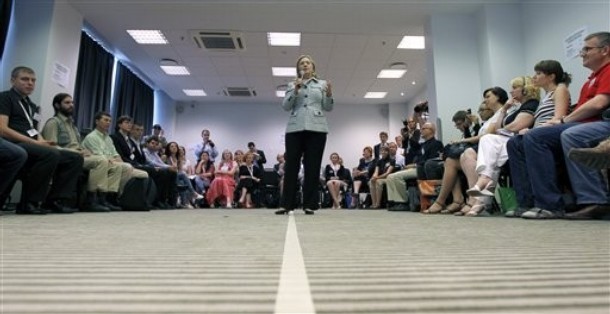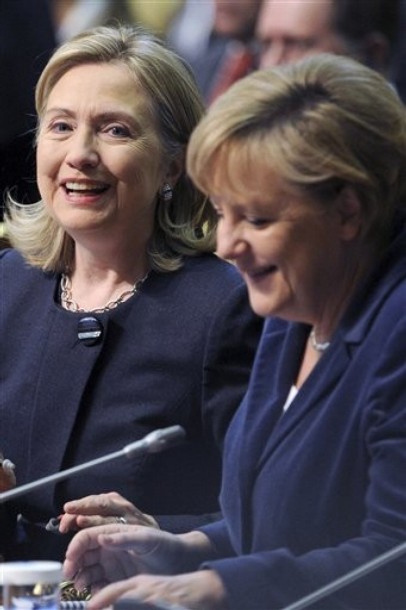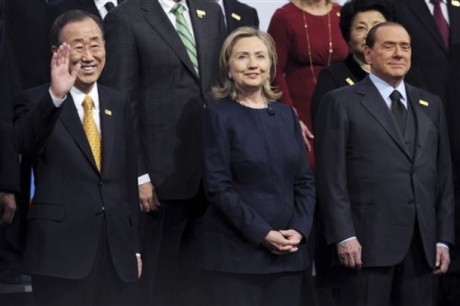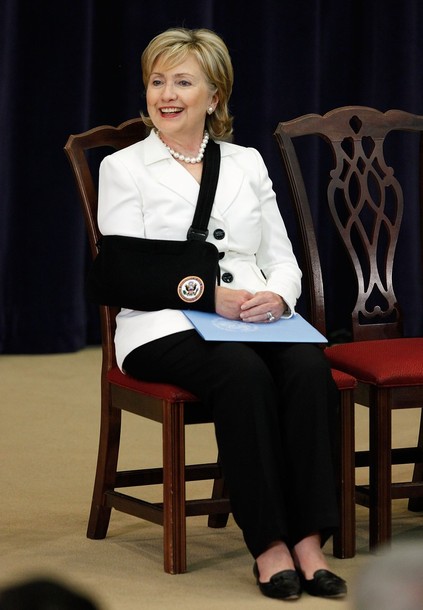Secretary Clinton’s Remarks at TechCamp Vilnius
June 30, 2011 by still4hill

Hillary first referred to what she came to call 21st century statecraft in two commencement addresses in New York in May 2009 and rapidly followed those with a Youtube on the subject.
2009 Remarks at the New York University Commencement Ceremony
May 13, 2009 by still4hill
Hillary at Barnard Today
May 18, 2009 by still4hill
When I graduated from college, diplomacy was mainly conducted by experts behind closed doors. They were primarily men. And very little of what they did was really visible to the rest of us. Today, diplomacy is no longer confined to the State Department or to diplomats in pin-striped suits. In this global age, we are engaging in 21st century statecraft, and it is carried out beyond the halls of government – in barrios and rural villages, in corporate boardrooms and halls of government as well, but also church basements, hospitals, union halls, civic and cultural centers, and even in the dorms and classrooms of colleges like this. The diplomacy of this age is fueled by personal engagement and interpersonal connections. And that’s where all of you come in. With new tools and technologies and with the first-rate education you’ve received, you now have the capacity to influence events in ways that no previous generation ever has... ...with these social networking tools that you use every day to tell people you’ve gone to get a latte or you’re going to be running late, you can unite your friends through Facebook to fight human trafficking or child marriage, like the two recent college graduates in Colombia – the country – who organized 14 million people into the largest anti-terrorism demonstration in history, doing as much damage to the FARC terrorist network in a few weeks than had been done in years of military action. (Applause.) And you can organize through Twitter, like the undergraduates at Northwestern who launched a global fast to bring attention to Iran’s imprisonment of an American journalist. And we have two young women journalists right now in prison in North Korea, and you can get busy on the internet and let the North Koreans know that we find that absolutely unacceptable. (Applause.) These new tools are available for everyone. They are democratizing diplomacy. So over the next year, we will be creating Virtual Student Foreign Service Internships to partner American students with our embassies abroad to conduct digital diplomacy. And you can learn more about this initiative on the State Department website.
Fully aware of the darker uses of technology, she explains that the idea was to use mobile technology and social media to promote American values and interests, and to help civil society across the globe hold governments accountable, document abuses, and empower marginalized groups. Hillary reviews technology abuses by some governments such as shutting down the internet in times of upheaval as well as uses made by civil society during such periods - among them those recounted here in relation to the chapter on Iran.
Technology was integral to her Quadrennial Diplomacy and Development Review (QDDR).
Hillary Clinton Announces Unprecedented QDDR at a Town Hall at the State Department
July 10, 2009 by still4hill
Hillary Clinton Announces QDDR at a Town Hall at USAID
July 13, 2009 by still4hill
State Department Launches “Opinion Space”
March 15, 2010 by still4hill
Video: Quadrennial Diplomacy and Development Review Townhall
December 15, 2010 by still4hill
Video: Secretary Clinton’s QDDR Town Hall at USAID
December 17, 2010 by still4hill
Hillary Calling!
November 26, 2010 by still4hill
Upcoming: On Hillary Clinton’s Agenda
November 28, 2010 by still4hill
Secretary Clinton’s Remarks to the Press on the Release of Confidential Documents
November 29, 2010 by still4hill
The United States strongly condemns the illegal disclosure of classified information. It puts people’s lives in danger, threatens our national security, and undermines our efforts to work with other countries to solve shared problems. This Administration is advancing a robust foreign policy that is focused on advancing America’s national interests and leading the world in solving the most complex challenges of our time, from fixing the global economy, to thwarting international terrorism, to stopping the spread of catastrophic weapons, to advancing human rights and universal values. In every country and in every region of the world, we are working with partners to pursue these aims. So let’s be clear: this disclosure is not just an attack on America’s foreign policy interests. It is an attack on the international community – the alliances and partnerships, the conversations and negotiations, that safeguard global security and advance economic prosperity... Now, I am aware that some may mistakenly applaud those responsible, so I want to set the record straight: There is nothing laudable about endangering innocent people, and there is nothing brave about sabotaging the peaceful relations between nations on which our common security depends. There have been examples in history in which official conduct has been made public in the name of exposing wrongdoings or misdeeds. This is not one of those cases. In contrast, what is being put on display in this cache of documents is the fact that American diplomats are doing the work we expect them to do. They are helping identify and prevent conflicts before they start. They are working hard every day to solve serious practical problems – to secure dangerous materials, to fight international crime, to assist human rights defenders, to restore our alliances, to ensure global economic stability. This is the role that America plays in the world. This is the role our diplomats play in serving America. And it should make every one of us proud.
Secretary Clinton’s Remarks Before Bilaterals
December 1, 2010 by still4hill

Secretary Clinton’s Remarks at OSCE Intervention
December 1, 2010 by still4hill |
When The Going Gets Tough, The Tough Get Charming Slideshow: Hillary Clinton Among The “Dissed”
December 1, 2010 by still4hill




You may recall that in chapter 16 about Libya Hillary mentions having had to recall former ambassador Gene Cretz because of credible threats against him. These she lays at the feet of Manning, Assange, and Wikileaks.
Video & Text: Hillary Clinton’s Policy Speech on Internet Freedom *Updated 01.23.2010 with Chinese Translation of Text*
January 21, 2010 by still4hill
We stand for a single internet where all of humanity has equal access to knowledge and ideas. And we recognize that the world’s information infrastructure will become what we and others make of it. Now, this challenge may be new, but our responsibility to help ensure the free exchange of ideas goes back to the birth of our republic. The words of the First Amendment to our Constitution are carved in 50 tons of Tennessee marble on the front of this building. And every generation of Americans has worked to protect the values etched in that stone. Franklin Roosevelt built on these ideas when he delivered his Four Freedoms speech in 1941. Now, at the time, Americans faced a cavalcade of crises and a crisis of confidence. But the vision of a world in which all people enjoyed freedom of expression, freedom of worship, freedom from want, and freedom from fear transcended the troubles of his day. And years later, one of my heroes, Eleanor Roosevelt, worked to have these principles adopted as a cornerstone of the Universal Declaration of Human Rights... As I speak to you today, government censors somewhere are working furiously to erase my words from the records of history...*We'll leave it here, with this speech, as Hillary does, knowing that every day, and probably especially again today as I post that link, people in countries where indeed authorities have tried to *erase her words" and **"erected electronic barriers" will find the words here even though they may be unable to access te State Department site. __________________________________________________________
Some countries have erected electronic barriers that prevent their people from accessing portions of the world’s networks. They’ve expunged words, names, and phrases from search engine results. They have violated the privacy of citizens who engage in non-violent political speech. These actions contravene the Universal Declaration on Human Rights, which tells us that all people have the right “to seek, receive and impart information and ideas through any media and regardless of frontiers.”**
Hillary Clinton’s ‘Hard Choices’ Retrospective: Introduction
Access other chapters of this retrospective here >>>>
__________________________________________________________####


